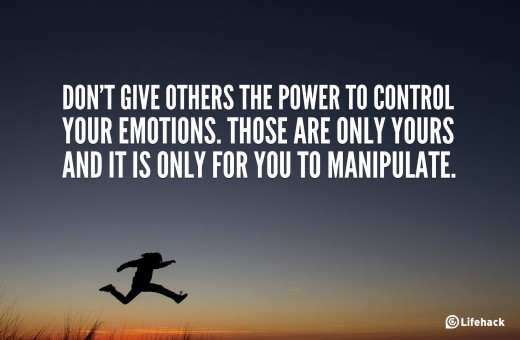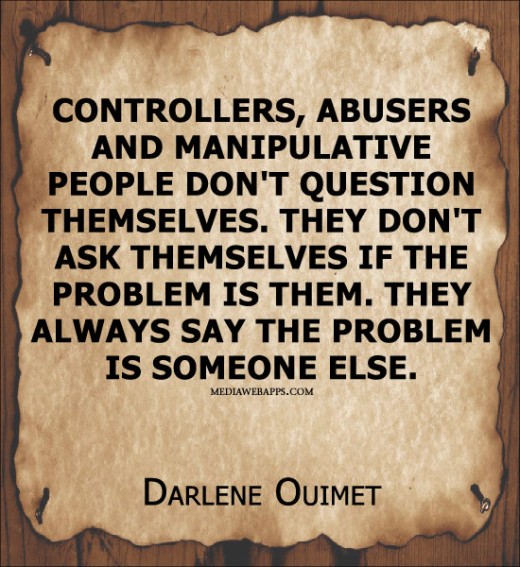Emotional Manipulation of Others

Emotional Manipulation
Those who manipulate others often use misleading tactics to get what they want. They are good at recognizing weakness in others. Emotional manipulation occurs when it's done on purpose.There are certain ways people act when they do this..
Threats.
Threatening to take away something valuable can include, loss of the relationship, promising to tell others one's deepest intimate secrets, or imposing unreasonable demands prompts fear and surrender. An example would be, "Do what I say or else" Screaming, yelling, and slamming doors are other examples. These pressure tactics lead to intimidation and public intimidation.
Weakness, dependence, helplessness, fear, depression, incompetence, and suicidal thoughts, are areas confusing want with need. The message is “Do as I ask or anything bad that happens will be your fault."
Guilt.
There are many ways to produce guilt. The're usually centered on areas of self-doubt such as, feeling incompetent as a husband, wife, or parent. Attacking these areas usually succeeds.
Silent Treatment.
This can be recognized in many forms. Brooding, refusal to speak, or ignorining others are prime examples.
Power in Numbers.
It 's easier to control someone when they feel outnumbered.
Victims.
Those pretending to be victims of mistreatment gain favor with a public display of self-pity. They blame a variety of causes. Bad luck, mistreatment, and poor circumstances to name a few.

Nature of Manipulation
Manipulation can be defined as: any attempt to control, through coercion (overt or covert), another person’s thoughts, feelings, or behaviors.
From this definition, manipulation would seem to have no advantages. However, if you are codependent and defined by others, there can be many. When you allow others to control your thoughts, and make decisions you don't have to:
-
Think for yourself.
-
Take risks or make difficult decisions.
-
Take a stand on controversial issues.
-
Feel responsible for negative outcomes.
-
Deal with conflict.
-
Struggle with emotional growth and development.
You can also blame others for your.
Manipulation is usually attempted by force, rescuing, guilt, weakness, and/or dependence. It can be be physical, verbal abuse, or threats. Some offer unsolicited help. Unsolicited means doing things for someone when there's no actual need. It's an attempt to make one feel indebted and obligated.
With manipulation, there's a physical, emotional response, such as increased anxiety or irritation. This is where boundaries differ from manipulation. Boundaries are statements of values. True boundaries are not threats. They're not compromised by the response of another.
For example, discovering your spouse has lied and accumulated a huge gambling debt. After getting professional help for them, they continue on their track to destruction. You must ask :
- What is your bottom line?
- What will you tolerate?
- At what point do you let them know you are fed up?
By becoming aware of interaction with others. Ask yourself these questions:
-
Is the interaction an attempt to communicate or feel like a contest?
-
Are you feeling anxious or irritated?
-
Do you want to exit the conversation?
-
Does the interaction feel like manipulation?
-
Are there attempts to use force, guilt, or weakness?
-
Are you a willing participant?
-
Is it easier not taking responsibility?
-
Are you attempting to manipulate others instead of setting clear boundaries?
-
Are you making distinctions between a value or preference?
- Preferences can be negotiated, but values shouldn't.
- We take it personally when others disagree with us.
- We avoid conflicts, because it feels like rejection. We need to communicate effectively, clearly and calmly, our values, preferences, and boundaries.
Too many manipulate others under the banner of spiritual reformation to get sympathy or leniency.

Prevention
Are you constantly taken advantage of? Those responsible must be confronted and given an ultimatum. It's best done in private. First, make sure they understand you value their friendship. Don't be surprised if they no longer want to be friends or take it personally. Recognize they have nothing of value to contribute to your life. When we do something simply because we are pressured, we are surrendering and giving control to others.
Understanding manipulative behavior change our relationships. We must disable their tactics. Some types are obvious, others more subtle. When tactics become ineffective, they may change strategies. Stand firm, and they will seek another victim.
Manipulators don't want to work at it. Don't make it easy for them. Understand how manipulators operate. Pointing out their shortcomings won't work. Change yourself to make their tactics ineffective.
Some manipulators aren't aware of their actions. Those who do are least likely to change. Perhaps they don't care, or have rationalized their actions as right. This leaves little incentive to change.
All manipulators are preoccupied with their own needs. Most know their behavior is unacceptable and will mask their attempts in various guises.
-
“I'm doing this because I care about you.”
-
“I am telling you this because I know more about it than you.”
-
“I am doing this for your own good.”
-
“I am telling you this because I feel obligated to."
Most manipulators feel they deserve to have their needs met, no matter what damage it causes others. They often rationalize it's alright because they had a bad childhood or any reason to make them feel the world owes everything.This behavior is usually caused by a deep distrust of others.
Recognizing the Mechanics
Some manipulators understand your wants and will use them against you if made easy enough. They gain insight into your personality by listening to you talk about your dreams, desires, and fears.
As others, love, security, money, career advancement, and acceptance by others are basic needs. When you understand this it's easy to spot a manipulator.
Manipulative relationships are activated by normal human drives such as gain, reward, loss, or avoidance. Manipulation, boils down to promises of net gain. Manipulative relationships, usually hold a promise of something valuable to gain.
Manipulation takes place over a prolonged period of time. Usually a relationship begins with a promise of gain, but in many cases evolves into a threat of losing something valuable.
This doesn't necessarily mean issues which are ignored will eventually disappear or be solved automatically. We must face the fact humans are fallible. The desire to control another has always been with us. It began in the Garden of Eden when the serpent manipulated Eve.
Selfishness is a natural human trait in many, but we don't have to let it control our lives.









